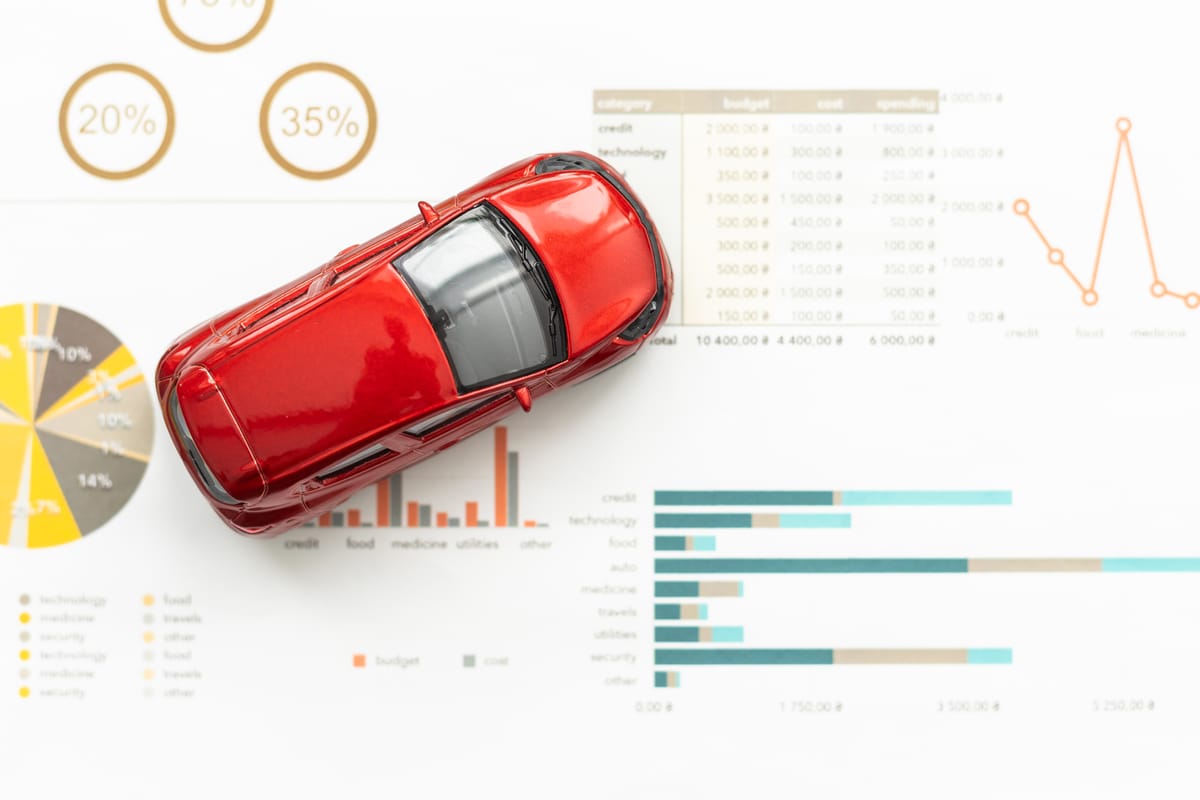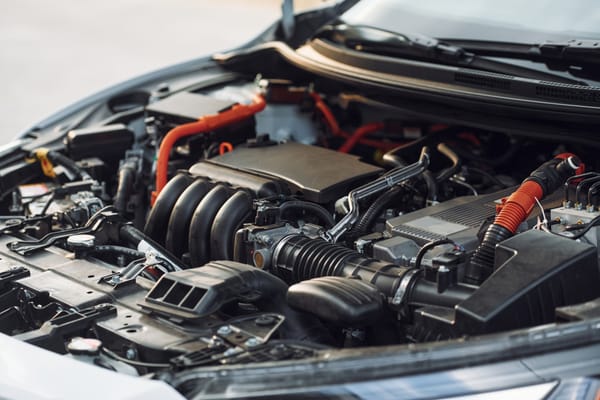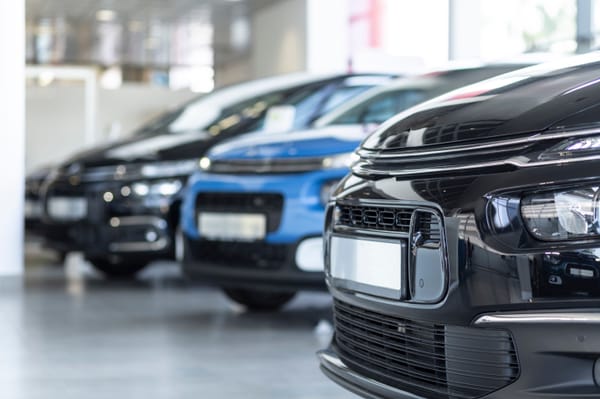Understanding Car Depreciation in Kenya’s Market: The Ultimate Guide

When you buy a car in Kenya, whether it’s described as “new” or “used”, one financial reality often overlooked is depreciation. It is a silent cost that greatly affects your vehicle’s value over time, sometimes it costs you dramatically more than maintenance or fuel expenses.
As a car owner, understanding how depreciation works and what influences it is an essential financial lesson that can save you thousands of shillings when the time comes to sell. This is particularly important to consider in the Kenyan car market, where the prevalence of "foreign-used" vehicles, the effects of diverse road conditions, and other local factors create a unique depreciation landscape
With this in mind, this Peach Cars guide explores how quickly your car can lose value, offering practical insights to help you make informed decisions about buying, maintaining, and eventually selling your vehicle.
What Is Depreciation and Why Does It Matter in Kenya?
Depreciation is the natural reduction of your car’s value over time. Simply put, it's the difference between what you paid for when buying the car and what someone else is willing to pay for it later. From the moment you leave the showroom with your car, it starts losing value due to wear and tear, age, and other external factors.
For many vehicle owners, depreciation is an unavoidable cost that affects both personal finances and investment decisions.
In Kenya, most of the vehicles we call “new” are actually foreign-used vehicles that are often about 7 years old, meaning that by the time you get behind the wheel, it has already lost over 60% of its value. Why? Because the most substantial value decline happens during your car’s first year on the road (approximately 15- 20%).
Interestingly, high-end luxury vehicles can lose up to 30% of their value during their first year, after which they follow the typical 15-20% rate. By the fifth year, most vehicles have lost 60-70% of their original value. In the subsequent year, the rate becomes moderate. This means that there are many factors affecting the depreciation of your car.
So, why is learning about depreciation important anyway? Well, it matters for several reasons:
- It helps you protect your investment. Knowing which vehicles hold their value better helps you protect your financial investment
- It’s important if you’re looking at car financing. Many Kenyans purchase vehicles through financing; understanding depreciation helps prevent negative equity situations, where you owe more than the car is worth
- Allows you to effectively plan for a resale. A clear understanding of depreciation allows for more strategic timing when selling your vehicle
- Helps you determine the total cost of owning a car. Factoring in depreciation provides a more accurate picture of how much a vehicle truly costs to own
How Was the 15% to 20% Depreciation Rate Arrived At?
The Kenya Revenue Authority (KRA), for import duties, established a specific depreciation schedule for valuing an imported vehicle. While it was primarily meant for the calculation of import duties, this KRA schedule also serves as an indicator of how age generally affects a car's value within the Kenyan market.
For most Kenyan car buyers, the vehicles they purchase have already undergone significant depreciation during their first 7-8 years before arriving in Kenya. The depreciation we experience locally is on top of what has already occurred in the vehicle's country of origin.
Here’s a table showing how KRA calculates depreciation:
Note: This schedule took effect from September 1, 2023. It is important to note that these depreciation percentages are based on the date of manufacture and not the year of importation into Kenya.
Factors That Contribute to Depreciation
While age is a major factor determining the depreciation rate, several other factors contribute to the loss in value. They include:
1. Vehicle Brand and Model Reputation
As hinted above, not all cars have the same depreciation value. It is a similar case when it comes to brands. Those with established reputations tend to hold their value longer than the lesser-known brands.
Why do you think Toyota dominates Kenyan roads? It’s because of their reliability and affordable maintenance. Models like the Toyota Corolla, Land Cruiser, and Hilux depreciate more slowly than competitors due to their durability and performance in various Kenyan conditions. Other vehicles that tend to hold their value reasonably well, apart from Toyotas, include Honda, Mazda, and Subaru vehicles.
European luxury brands like Mercedes-Benz and BMW, while prestigious, often experience steeper depreciation in Kenya. This is primarily due to higher maintenance costs and the perception that parts availability may be limited compared to Japanese models.
Chinese brands, which have gained market share in recent years due to competitive pricing, typically experience the most depreciation. Despite improvements in quality, these vehicles lose value faster due to lingering perceptions about long-term reliability and resale difficulties.
2. Fuel Efficiency and Engine Type
With fuel prices in Kenya remaining consistently high, fuel-efficient vehicles depreciate more slowly. Petrol prices in Nairobi currently average slightly above Ksh 170 per litre, making fuel economy a major consideration for buyers. Similarly:
- Diesel vehicles, once popular for their fuel efficiency, have seen increasingly faster depreciation rates. This shift is attributed to changing government policies, environmental concerns, and the narrowing price gap between diesel and petrol fuel.
- Hybrid vehicles, though still relatively uncommon in Kenya, are beginning to show strong value retention. The Toyota Prius and Aqua models, for instance, typically lose value more slowly than their conventional counterparts, especially in urban areas where fuel efficiency is a great concern.
- Electric vehicles are still a relatively new phenomenon in Kenya, making definitive depreciation data limited. However, it can be predicted that the concerns about charging infrastructure and battery replacement costs might contribute to faster initial depreciation compared to conventional vehicles.
In the used car market, like Kenya, the fuel efficiency advantage is even more important as vehicles age. Older vehicles typically become less fuel-efficient, but well-maintained Japanese models tend to maintain better efficiency over time compared to European counterparts.
3. Vehicle Type and Size
SUVs and crossovers have become increasingly popular in Kenya, partly due to the country's varied road conditions. The occasionally unpredictable weather and the bad roads push car buyers to consider these two types of vehicles to minimize damage.
For this reason, these vehicle types maintain stronger resale values compared to sedans.
Commercial vehicles and vans used for business purposes typically depreciate more slowly in Kenya due to their utility value. Pick-up trucks like the Toyota Hilux and Isuzu D-Max retain value particularly well, especially in rural areas and for business applications.
4. Mileage and Vehicle Age
Mileage remains the biggest factor affecting vehicle depreciation, not just in Kenya, but across the globe.
To better illustrate this, below is an image showing a car’s average valuation vs mileage:
Image Source: CarWow
From the graph, you’ll notice that:
- A car’s value drops significantly between 10,000 miles (approximately 16,093 km) and 60,000 miles (approximately 96,561 km). By around 100,000 miles (approximately 160,934 km), the depreciation begins to level off.
- The most depreciation occurs when the car surpasses 20,000 miles (approximately 32,187 km), with an average depreciation of 24% compared to its value at 10,000 miles.
- Between 20,000 miles (approximately 32,187 km) and 90,000 miles (approximately 144,841 km), the depreciation rate is about 17%. At 160,000 kilometres, there’s an additional 19% decrease in value.
- By the time your car reaches around 180,000 km, its value will have dropped by £879 (approximately 143,622 Kenya shillings, using an approximate exchange rate of 1 pound = 163.4 Kenya shillings) from the date it was manufactured.
Keep in mind that local mileage accumulated on Kenyan roads often has a more pronounced impact on depreciation than the same distance traveled on smoother foreign roads. This is due to the harsher driving conditions in Kenya, including rough terrain, unpaved roads, and extreme weather conditions.
Perhaps somewhat reassuring is that cars with over 200,000 kilometers on the odometer experience much slower depreciation rates, as they've already reached a baseline value floor.
5. Colour and Aesthetics
Vehicle colour has a surprising impact on depreciation rates. The most sold vehicle colours are white, silver, and black. These colours are usually considered by many as ‘safe’ in terms of widespread acceptance.
In Kenya, these colours are perceived to be easy to maintain and to find buyers, therefore, the depreciation rate is slow. The pool of car buyers who fancy bright colours is limited, and as a result, you might be forced to accept a low price when selling.
- Bright colours like red, blue, or green typically depreciate faster, especially for larger vehicles.
- Unusual colours like purple, gold, or pink may depreciate even faster!
This, however, is in the Kenyan market. Depreciation by colour is influenced by cultural preferences and practical considerations like ease of maintenance. An iSeeCars.com research in the US, for instance, showed that yellow cars depreciated the least in 3 years (60% less than the average vehicle).
The reason? Well, while not many people want a yellow car, there are more people who want one that exists, which is why yellow performs so well on the secondary market.
6. Condition of the Car
Perhaps unsurprisingly, a vehicle's physical and mechanical condition also affects its depreciation rate. Here:
- Vehicles with comprehensive service records from authorised dealerships typically command a higher resale value than identical models without documentation; this is because it assures the buyer of the car’s reliability.
- Major mechanical issues accelerate depreciation. Problems with the engine, transmission, or electronic systems can reduce a vehicle's value by a large margin, depending on the severity and repair costs. Your vehicle, therefore, should have:
- Suspension systems that are properly maintained and upgraded for local road conditions,
- Cooling systems that can handle Kenya's climate variations,
- An undercarriage protection that prevents excessive damage from rough roads
- Clean, well-maintained interiors with minimal wear can improve resale value. Look at it this way, leather interiors, while more expensive initially, tend to depreciate more slowly than cloth upholstery in the Kenyan market. This is especially true for higher-end vehicles, where second-hand buyers often expect leather.
- Equally important are the car’s interior features. Vehicles equipped with navigation systems, reverse cameras, and smartphone integration have a higher resale value than those without.
- Minor scratches and dents, rust, among others, while seemingly insignificant, can reduce a vehicle's value. If the damages are severe, the value of the car will drop, even if the repairs were professionally completed.
And since you are dealing with a used car that is typically more than 7 years old in the Kenyan market, factors such as belts and hoses, the aftermarket parts used in previous repairs, the condition of the electrical system- especially for vehicles used in flood-prone areas- and evidence of rust prevention treatments, particularly for vehicles near coastal regions, are highly important in determining your car’s aftersale value value.
External Market Factors
Your car’s depreciation isn’t determined solely by the vehicle itself or your actions. Market dynamics also influence the prices. Here’s how:
- If a large number of foreign-used vehicles, for example, are being imported and are priced competitively, this can sometimes lead to adjustments in the pricing of locally used vehicles. Similarly, if the cost of imported cars rises or their availability decreases, the demand for used cars will increase, potentially driving up their prices.
- Government policies related to car imports, such as changes in taxes or incentives aimed at boosting local manufacturing, can also have indirect but serious effects on the used car market.
- Changes in government regulations, such as the enforcement of an age limit on imported used vehicles, directly affect the supply of older cars and can lead to price adjustments, particularly for newer used models that fall within the import regulations.
- Also, KRA's modifications to depreciation rates for tax purposes have increased the initial cost of imported used cars, which can then be reflected in their resale values.
- Potential future regulations that might further restrict the importation of older vehicles could also have a considerable impact on the availability and pricing of used cars in Kenya.
- When people have less disposable income, the demand for both new and used cars may decrease, potentially leading to lower prices. Of course, during times of economic growth, there’s generally an increase in demand for vehicles.
Apart from these factors, fuel price fluctuations shift market preferences and, consequently, depreciation rates. When fuel prices increase, as they have in recent years, gas-guzzling vehicles depreciate more rapidly as demand shifts toward more economical options.
Currency exchange rates also play a role in the Kenyan automotive market, where many vehicles are imported. When the Kenyan Shilling weakens against major currencies, the cost of foreign-used imported vehicles rises, which can temporarily slow the depreciation of used vehicles already in the country.
How Do You, Then, Minimize Your Car’s Depreciation?
Almost everyone is ultimately looking to upgrade their vehicle at some point, and you don’t want to suffer a loss. You can avoid this by doing the following:
Make Strategic Buying Decisions
When shopping for a used vehicle in Kenya, consider cars that have been in the country for just 1-2 years. This lets the previous owner absorb the initial post-import depreciation while giving you a well-acclimatized vehicle. Before purchasing, investigate how specific models have historically held their value in Kenya's used car market after 10+ years of use.
Remember, while fancy features might seem attractive, basic, reliable models often hold their value better in Kenya's used car market. Advanced electronics and complex systems can become expensive maintenance items as vehicles age past 10 years.
Keep Your Car Well-Maintained
Stick to regular servicing at recommended intervals. This preserves the mechanical condition and provides valuable documentation for future buyers.
Cars with clearly documented service history showing regular maintenance generally retain 10-15% more value than similar vehicles without records. Therefore, maintain a file with all the receipts and service documentation, and ensure that you address minor issues promptly.
Mind Your Driving Patterns
If you can, try to conserve your car’s mileage when possible. Consider alternatives like using public means or a taxi occasionally. While at it, drive considerately. This can cause premature wear on mechanical components.
When possible, park in shaded or covered areas to protect from Kenya's intense sun and seasonal rains
Preserve Your Car’s Appearance
Wash and wax regularly to protect paintwork, use seat covers in vehicles that experience heavy use, address small dings, chips, or upholstery damage before they worsen, and consider paint protection films or ceramic coatings, especially valuable in Kenya's intense UV conditions
Pro Tip: Invest in professional detailing once or twice annually. It will help preserve your car’s appearance and its resale value.
Time When to Sell Your Car
Consider selling before expensive maintenance is due, such as timing belt replacements or major services.
Pay attention to market demand trends. For instance, smaller, fuel-efficient vehicles often see increased demand during periods of fuel price increases.
During economic downturns, consider postponing selling if possible, as the entire used car market typically sees reduced demand.
Making Smart Decisions with Your Used Car in Kenya
Understanding how various factors affect your car's depreciation is essential when buying or selling in Kenya's used car market. For most Kenyan car owners dealing with vehicles that are already several years old (typically 7-15 years from manufacture), knowing how to maximize value becomes even more crucial.
By focusing on key elements like maintaining proper service records, keeping your vehicle in good condition, and timing your sale based on market conditions, you can minimize further depreciation and get the best possible price when it's time to sell.
How Peach Cars Can Help You Navigate the Used Car Market
At Peach Cars, we specialize in Kenya's used car market – helping everyday Kenyans sell their current vehicles and find their next reliable used car. We provide sellers with a stress-free selling process by managing all the paperwork and negotiations for you. Our platform connects you with a larger pool of serious, verified buyers. For buyers, we offer thoroughly inspected used cars, ensuring you know exactly what you're purchasing, along with realistic expectations for depreciation. We also help you find a vehicle that suits both your financial and lifestyle needs!
Contact Peach Cars today at +254 709 726 900 or visit our showroom on Lang'ata Road, James Gichuru Road, Lavington or Windsor, along Northern Bypass.




